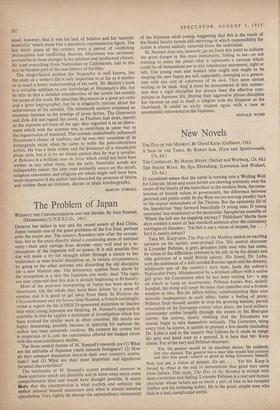The Problem of Japan
WITHOUT THE CHRYSANTHEMUM AND THE SWORD. By Jean Stoetzel. (Heinemann / U.N.E.S.C.O., 16s.)
DESPITE her defeat in war and the recent ascent of Red China, Japan remains one of the great problems of the Far East, perhaps even the major one. The country flounders now after the occupa- tion, but in the years directly ahead a continuing sense of national unity—their only salvage from disaster—may well lead to a re- emergence of the Japanese will to power. It is still possible that she will make a try for strength either through a return to her traditional or near-feudal disciplines or, in certain circumstances, by going to the other extreme and discarding the old discipline for a new Marxist one. The democracy applied from above by the occupation is a skin the Japanese can easily shed. The signs are now apparent that this skin is already beginning to fit loosely.
Most of the post-war interpreting of Japan has been done by Americans. On the whole they have been driven by a sense of mission and it is good to get away from them. In Without the Chrysanthemum and the Sword Jean Stoetzel, a French sociologist, writes a report on his UNESCO-sponsored excursion to inquire into what young Japanese are thinking. M. Stoetzel's approach is scientific in that he applies a technique of investigation which has been evolved for similar work in other countries. His results are highly interesting, possibly because in applying his methods the author has been extremely cautious. He respects his system but is suspicious of it, and the conclusions offered are hedged about with the most conciliatory doubts.
The three central themes of M. Stoetzel's research are (1) What are the attitudes of Japanese youth towards foreigners? (2) How do they comport themselves towards their own country's institu- tions? and (3) What are their most important and significant personal characteristics?
The mechanics of M. Stoetzel's system produced answers to these questions which are plausible and in some cases much more comprehensive than one would have thought possible. It seems Ilkoly that the interpretation is what matters and certainly the author allowed himself excursions into what is almost intuitive speculation. Very rightly he stresses the extraordinary immaturity of the Japanese adult young, suggesting that this is the result of the feudal family system still surviving in which responsibility for action is almost entirely removed from the individual.
M. Stoetzel does not, however, go on from this point to indicate the great danger in this mass immaturity, failing to see—or not wanting to make the point—that it represents a vacuum which could be of tremendous use to any totalitarian movement, right or left. The young men and women who might and ought to be shaping the new Japan are not, apparently, emerging as a genera- tion with any sort of coherence of its own. They seem almost waiting to be used. And it must be remembered in this connec- tion that a rigid discipline has always been the effective com- pulsion in Japanese life. During their aggressive phases discipline has become an end in itself, a religion with the Emperor as the God-head. It could so easily happen again with a race as emotionally introverted as the Japanese.


































 Previous page
Previous page